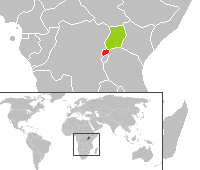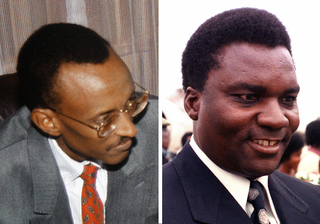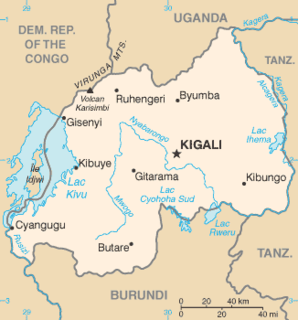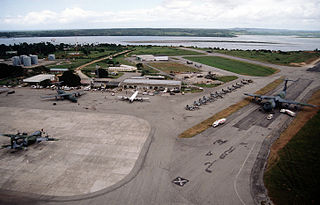| UN Security Council Resolution 893 | |
|---|---|
 Satellite view of Rwanda | |
| Date | 6 January 1994 |
| Meeting no. | 3,326 |
| Code | S/RES/893 (Document) |
| Subject | Rwanda |
Voting summary | 15 voted for None voted against None abstained |
| Result | Adopted |
| Security Council composition | |
Permanent members | |
Non-permanent members | |
United Nations Security Council resolution 893, adopted unanimously on 6 January 1994, after reaffirming resolutions 812 (1993), 846 (1993), 872 (1993) and 891 (1993) on Rwanda, the Council noted that the situation in Rwanda could have implications for neighbouring Burundi and authorised the deployment of a second military battalion of the United Nations Assistance Mission for Rwanda (UNAMIR) to the demilitarised zone. [1]

United Nations Security Council resolution 812, adopted unanimously on 12 March 1993, after expressing its alarm at the humanitarian situation in Rwanda due to the ongoing civil war, in particular the number of refugees and displaced persons which posed an international threat to peace and security, the Council called upon the Government of Rwanda, the National Republican Movement for Democracy and Development, and the Rwandan Patriotic Front to respect a ceasefire that took place on 9 March 1993 and implement other agreements they had committed themselves to. It was the first resolution on the situation in Rwanda.

United Nations Security Council resolution 846, adopted unanimously on 22 June 1993, after reaffirming Resolution 812 (1993) on the situation in Rwanda and noting a report by the Secretary-General Boutros Boutros-Ghali, the Council established the United Nations Observer Mission Uganda–Rwanda (UNOMUR) for an initial period of six months.

United Nations Security Council resolution 872, adopted unanimously on 5 October 1993, after reaffirming resolutions 812 (1993) and 846 (1993) on the situation in Rwanda and Resolution 868 (1993) on the security of United Nations operations, the Council stressed the need for an international force in the country and therefore established the United Nations Assistance Mission for Rwanda (UNAMIR).
Contents
The Council urged both parties to co-operate with the peace process, comply with the Arusha Accords and in particular to establish a broad-based transitional government as soon as possible. It was stressed that continued support for UNAMIR will depend upon the implementation of the Arusha Accords. [2] Attempts to improve dialogue among the parties by the Secretary-General Boutros Boutros-Ghali and his Special Representative were welcomed.
The Arusha Accords, officially the Peace Agreement between the Government of the Republic of Rwandaand the Rwandan Patriotic Front, also known as the Arusha Peace Agreement or Arusha negotiations, were a set of five accords signed in Arusha, Tanzania on 4 August 1993, by the government of Rwanda and the rebel Rwandan Patriotic Front (RPF), under mediation, to end a three-year Rwandan Civil War. Primarily organized by the Organisation of African Unity and the heads of state in the African Great Lakes region, the talks began on 12 July 1992, and ended on 4 August 1993, when the accords were finally signed.

Boutros Boutros-Ghali was an Egyptian politician and diplomat who was the sixth Secretary-General of the United Nations (UN) from January 1992 to December 1996. An academic and former Vice Foreign Minister of Egypt, Boutros-Ghali oversaw the UN over a period coinciding with several world crises, including the breakup of Yugoslavia and the Rwandan genocide. He was then the first Secretary-General of the Organisation internationale de la Francophonie from 16 November 1997 to 31 December 2002.
The efforts of Member States, United Nations agencies, the Organisation of African Unity and non-governmental organisations which had provided humanitarian aid were welcomed. Finally, the Secretary-General was requested to continue to monitor the size and cost of UNAMIR.

The Organisation of African Unity was an intergovernmental organization established on 25 May 1963 in Addis Ababa, Ethiopia, with 32 signatory governments. One of the main heads for OAU's establishment was Kwame Nkrumah of Ghana. It was disbanded on 9 July 2002 by its last chairperson, South African President Thabo Mbeki, and replaced by the African Union (AU). Some of the key aims of the OAU were to encourage political and economic integration among member states, and to eradicate colonialism and neo-colonialism from the African continent. Although it achieved some success, there were also differences of opinion as to how that was going to be achieved.

Humanitarian aid is material and logistic assistance to people who need help. It is usually short-term help until the long-term help by government and other institutions replaces it. Among the people in need are the homeless, refugees, and victims of natural disasters, wars and famines. Humanitarian aid is material or logistical assistance provided for humanitarian purposes, typically in response to humanitarian relief efforts including natural disasters and man-made disaster. The primary objective of humanitarian aid is to save lives, alleviate suffering, and maintain human dignity. It may therefore be distinguished from development aid, which seeks to address the underlying socioeconomic factors which may have led to a crisis or emergency. There is a debate on linking humanitarian aid and development efforts, which was reinforced by the World Humanitarian Summit in 2016. However, the approach is viewed critically by practitioners.

![United Nations Assistance Mission for Rwanda Failed UN Mission to mediate peace in Rwanda leading up to the [[Rwandan genocide]]](https://upload.wikimedia.org/wikipedia/commons/thumb/5/52/Emblem_of_the_United_Nations.svg/320px-Emblem_of_the_United_Nations.svg.png)












